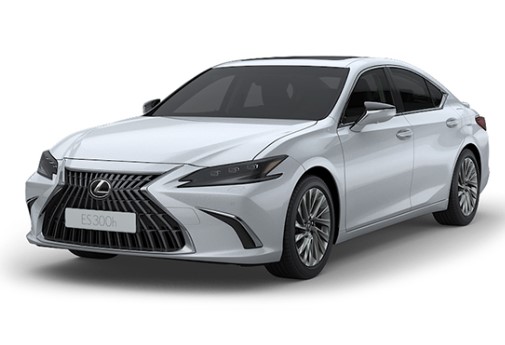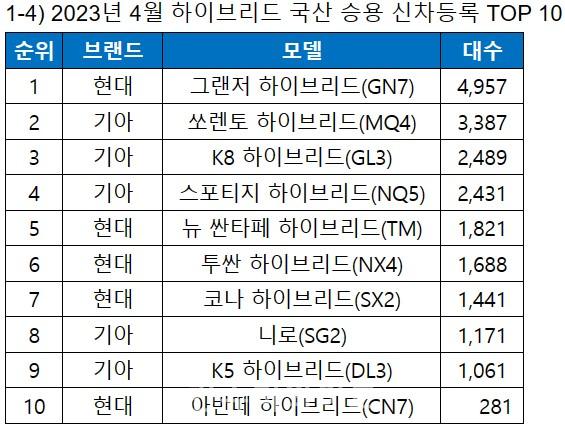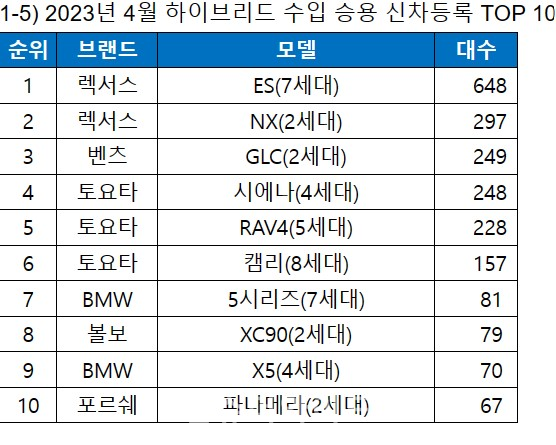
[Consumerwide_ HueSoung, Jun Reporter / Yohan, Bok Reporter] It seems that consumption-value is ongoing in the new car market. Consumption-value based customers who prioritize the environment are choosing hybrid cars, which are considered to be eco-friendly cars. In April, the growth rate of hybrid cars was remarkable in terms of sales compared to cars with other types of fuel. On the 3rd, referring to hybrid car sales trend data in April commissioned by Carisyou Data Lab, the number of new car registrations was 148944, which is a 14.7% decrease from a month earlier. Compared to the same month last year, there was a 2.1% increase. Domestic new car registration has recorded 127764, which is a 4.2% decrease from a month ago and a 5% increase from the same month last year. For imported cars, 21180 new cars were registered, which is a 17.4% decrease from last month and a 12.4% increase from the same month last year.
In April, the growth rate of hybrid cars was noticeable. The sales record for hybrid cars was 23501, which is a 15.3% decrease from last month and a 25.6% increase from the same month last year. It seems quite different from the growth of gasoline cars. 77924 gasoline cars have been sold, which is only a 3.5% increase from the same month last year. Meanwhile, diesel cars recorded 25482 in April, which is a 12.5% decrease from April 2022. In the aspect of market share, the record shows a different dimension according to fuel type. Gasoline cars took 52.3%, diesel cars 17.1%, and hybrid cars 15.8%. So far, diesel cars have a higher market share than hybrid cars. However, soon it may be turned over.
Customers in their 50s were the main players in hybrid car growth. In terms of gender and age category, males in their 50s have purchased the most hybrid passenger cars, recording 4269 in a month's time. Males in their 40s took second by recording 2843. Males in their 60s recorded 2904 and males in their 30s recorded 2552, which is about the level of males in their 50s. Male customers in their 20s (793) and 70s (461) seemed relatively more passive in purchasing than customers in other age groups. Female sales records have a similar flow. Female customers in their 50s purchased the most by recording 1493, and female customers in their 40s chased them by recording 1091. For the rest of the customers, it follows: 60s, 746, 20s, 349, 70s, 153.
In the regional category, Gyounggido was the home ground for hybrid car sales growth. 5757 hybrid cars were sold in a month, ranking first in the regional sales competition, just in Gyounggido. Regions with records over 1000 were Seoul (2527), Inchoen (1840), Gyoungnam (1724), Busan (1417), Jeju (1361), and Ulsan (1084). The records of the rest of the regions are as follows: Chungnam (918), Daegu (847), Jeonbuk (719), Gwangju (715), Chungbuk (621), Gangwon (638), Daejeon (562), and Sejong (190).

Then, what was the choice of consumption-value-based customers? For domestic cars, Hyundai and Kia led the market. Chevrolet, KG Mobility, and Renault Korea couldn't enter the April TOP 10 list in the hybrid sales competition. Hyundai cars sold the most in domestic hybrid car market competition in April. The second to fourth ranks were all taken by Kia. The fifth to tenth ranks are as follows: fifth to seventh, Hyundai; eighth and ninth, Kia; tenth, Hyundai.

For imported cars, Japanese cars were remarkable. In the imported hybrid car sales competition (Top 10), Lexus cars took both first and second. Toyota cars took fourth to sixth place. In other words, excluding Benz (third), the top 5 were all Japanese cars. In response to Japanese cars, German cars and Swedish cars defended themselves pretty well. The European car ranking is as follows: Benz, third; BMW, seventh and ninth; Volvo cars, eighth; Porsche, tenth.
- [Consumption value - May project Car ②] In April, the sales of new electric cars increased slightly, which is a 2.1% increase from last year...value-based consumption
- [Consumption value-May project-Car③] Used car market trend in April...Ongoing eco-friendly trend
- [Consumption value-May project-Car④] Car industry is practicing ESG...The social contribution includes sponsoring and volunteer activities.

